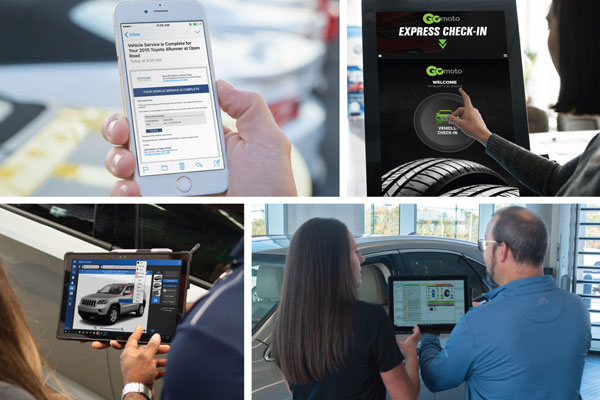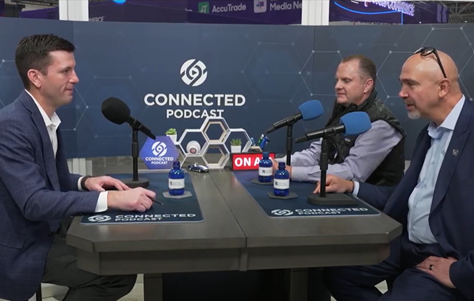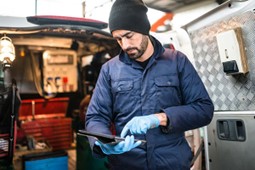The Changing Landscape: How to Surpass Expectations in Service

Article Highlights:
- All online or all in-store? How about a digital hybrid experience.
- There's a gap between what customers want and what they're really getting.
As dealers continue to digitize more and more of their operations, finding the right balance between physical and digital customer interactions has become trickier.
There’s no question that all dealerships have moved to an increasingly digital business model. The explosion of information technology made that inevitable.
But, some have struggled with the shift more than others, and even early adopters and those on the cutting edge of dealership evolution still run into a key problem: How much digitization is too much, and how much is not enough?
This is a valid question. As it turns out, not all consumers are ready to go fully digital. 78 percent of automotive consumers still want to make that final purchase in person.1 Similarly, 70 percent aren’t yet comfortable with the idea of a fully online buying process.2
It’s also important to note consumers’ willingness to adapt to this new way of doing business depends heavily on the choices dealers make. In other words, if dealers aren’t enthusiastic about delivering fully online experiences – meaning you don’t invest in a quality website, digital communications with consumers, highly responsive staff, etc. – then of course your customers will prefer to do business with you in person.
So, where does that leave us in terms of balancing digital and physical customer interactions? With what I like to call a “digital hybrid experience.”
The Digital Hybrid Experience
The automotive industry, both in sales and service, currently operates in a hybrid scenario: an industry and a market amid transition, with partially digitized and partially in-person processes. In this framework, every dealership has a slightly different ratio of physical-to-online steps in its sales and service processes, and every consumer has different expectations.
In other words, some of your customers prefer a mostly online process, some want to come into the store to conduct business the old-fashioned way, and some go through a mix of the two based on whatever’s convenient at the moment.
Take your service department, for example. From a recent study, “The Changing Automotive Landscape: From In-Store to Online,” we compiled the following statistics on consumer behaviour in service, and it perfectly illustrates the need to deliver a digital hybrid experience.
When asked how they would prefer to complete specific actions during their service visit, 72 percent of respondents chose to schedule their visit online, while a little over 30 percent liked the idea of checking in and dropping off their keys using a self-service station or kiosk even though this is a comparatively new industry offering.
Meanwhile, 55 percent of respondents indicated they would like to receive text or email links to review recommended maintenance, while 49 percent would like to receive photos or videos of vehicle damage to see what needs repairing.
These data points, among others, illustrate the need to meet expectations both inside and outside the dealership and before, during, and after the service visit.
But, matters get more complicated when considering the divide between what consumers say they want and what their actual behaviours indicate.
Stated Preferences vs. Actual Behavior
Even though 72 percent of respondents said they would prefer to schedule online, only 24 percent actually did when scheduling their last service visit.
The check-in process has some of the biggest disparities between consumer preferences and observed behaviours. For example, only 6 percent of respondents checked in using a kiosk, although 33 percent said they would like to. Similarly, four percent used a mobile app to check-in, while a whole 40 percent said they would’ve preferred to.
What to make of this discrepancy? If dealers don’t take the necessary steps to deliver a quality online experience, then their customers will be forced to default to normal in-store interactions.
So, what is this apparent divide really indicating? Consumers want both digital and in-person options – they want a hybrid experience. Too often, however, dealerships are failing to deliver.
And, that failure will lower customer satisfaction, lead to higher costs and lower revenues due to process inefficiencies, and unnecessarily weaken your competitive edge.
What Does a Digital Hybrid Experience in Service Look Like?
The good news is, nothing revolutionary is required to deliver a digital hybrid experience – one that meets each of your unique customers where they are – in your service department.
We’ve established consumers want more digital options in service, such as text and email links, photo and video evidence, and additional forms of check-in and checkout using self-service technology.
All these technologies exist. Here are a few that’ll help you get the most out of a digital hybrid experience:
- Self-service kiosks that create a self-led check-in option in the service department, putting your customers in the driver’s seat of their own experience while also increasing revenue opportunities and streamlining your operation.
- A system to help your service advisors upsell by sending service recommendations to the customer’s mobile device, improving transparency with specific repair descriptions, and increasing urgency with promise times that depend on approval speed.
- A mobile application that allows dealership personnel to take and send photos on mobile devices, documenting a vehicle’s condition and opening a line of transparent communication that helps secure approvals faster and streamlines service processes.
- A payment processing tool that delivers convenient and secure payment experiences to your customers, operating across all channels from email to near-field communication (NFC).
This is the power of a digital hybrid experience in service, an experience designed to meet our current moment – and to meet your customers where they are.
1, 2 The Changing Automotive Landscape: From In-Store to Online – Reynolds and Reynolds
Related Articles:
Earlier this year, I had the privilege of diving into a conversation with Ed Roberts, COO of Bozard Ford, and what struck me was how…
Key drop-off is one of the first impressions a customer has of your service drive. Both you and your customer want it to be as…
We live in an era where a simple tap on your phone can bring almost anything to your doorstep within hours. According to Statista, in…
Here in the North, we face the dreaded winter months. They’re full of stuffy noses, sore throats, and endless coughs. Although sicknesses like the flu…




















